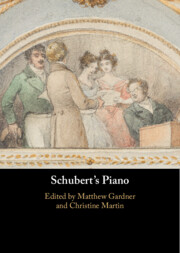Book contents
- Schubert’s Piano
- Schubert’s Piano
- Copyright page
- Contents
- Figures
- Tables
- Music Examples
- Notes on Contributors
- Acknowledgements
- Abbreviations and Conventions
- Introduction
- Part I The Piano in Schubert’s World
- 1 Franz Schubert as a Pianist
- 2 Between Society and Solitude: Schubert’s Improvisations
- 3 The Piano in Schubert’s Lied Texts
- 4 Schubert’s Four-Hand Piano Music
- Part II Instruments and Performance
- Part III Sound and Musical Imagery
- Part IV Understanding Schubert’s Writing for the Piano
- Select Bibliography
- Index
4 - Schubert’s Four-Hand Piano Music
from Part I - The Piano in Schubert’s World
Published online by Cambridge University Press: 31 August 2024
- Schubert’s Piano
- Schubert’s Piano
- Copyright page
- Contents
- Figures
- Tables
- Music Examples
- Notes on Contributors
- Acknowledgements
- Abbreviations and Conventions
- Introduction
- Part I The Piano in Schubert’s World
- 1 Franz Schubert as a Pianist
- 2 Between Society and Solitude: Schubert’s Improvisations
- 3 The Piano in Schubert’s Lied Texts
- 4 Schubert’s Four-Hand Piano Music
- Part II Instruments and Performance
- Part III Sound and Musical Imagery
- Part IV Understanding Schubert’s Writing for the Piano
- Select Bibliography
- Index
Summary
Schubert was fond of writing four-hand music to be played by two pianists sitting on the same piano bench. His thirty-four compositions in this medium range from the earliest extant composition in his hand (a Fantasy penned in 1810) to his Rondo in A Major finished in the summer of 1828. No composer ever approached the piano duet with the seriousness Schubert did, and his corpus of four-hand pieces stands as the apex of the genre. The four-hand configuration seemed ideally suited to his temperament, as it was a congenial form of music-making that was emblematic in Biedermeier culture as an activity of friendship and sociability. It is thus not surprising that these works were a staple in his Schubertiads and ranked among his most successful publications during his lifetime. But the four-handed configuration was also a critical medium for the transmission and reception of much of his orchestral and chamber music. The many piano transcriptions of Schubert’s instrumental music arranged for four-hands issued by publishers over the course of the nineteenth century allowed any two decently practised amateur pianists a chance to get to know his music by reproducing it in the domestic space of the bourgeois parlour.
Keywords
- Type
- Chapter
- Information
- Schubert's Piano , pp. 70 - 90Publisher: Cambridge University PressPrint publication year: 2024

